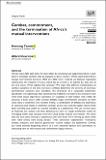Files in this item
Combat, commitment, and the termination of Africa’s mutual interventions
Item metadata
| dc.contributor.author | Tamm, Henning | |
| dc.contributor.author | Duursma, Allard | |
| dc.date.accessioned | 2022-08-09T13:30:02Z | |
| dc.date.available | 2022-08-09T13:30:02Z | |
| dc.date.issued | 2023-03 | |
| dc.identifier | 258120229 | |
| dc.identifier | b4b61124-e88a-4f91-964c-da226bd46ae9 | |
| dc.identifier | 000834554800001 | |
| dc.identifier | 85147132502 | |
| dc.identifier.citation | Tamm , H & Duursma , A 2023 , ' Combat, commitment, and the termination of Africa’s mutual interventions ' , European Journal of International Relations , vol. 29 , no. 1 , pp. 3–28 . https://doi.org/10.1177/13540661221112612 | en |
| dc.identifier.issn | 1354-0661 | |
| dc.identifier.other | ORCID: /0000-0002-0051-5632/work/117210945 | |
| dc.identifier.uri | https://hdl.handle.net/10023/25800 | |
| dc.description.abstract | African states fight each other far more often by simultaneously supporting rebels in each other’s intrastate conflicts than by engaging in direct warfare. While nearly half of these mutual interventions between 1960 and 2010 were resolved via bilateral negotiated settlements, the majority of cases ended due to events in, or actions by, only one of the two states. What explains this variation? We argue that different combinations of combat outcomes in the two intrastate conflicts determine the severity of interstate commitment concerns and therefore the likelihood of a successful settlement. Specifically, we hypothesize that commitment problems are likely to be overcome only when both states experience stalemates or successes in their battles with rebels. By contrast, if both states suffer combat defeats, major commitment concerns on both sides make a settlement very unlikely. Lastly, a combination of defeats and stalemates or successes also makes a settlement unlikely, as the state with the upper hand is likely both unwilling and unable to commit credibly to a settlement. We use several cases to illustrate our theory and then demonstrate how its causal mechanism works by leveraging within-case variation from the Chad–Sudan mutual intervention. We show that the two states reached a settlement only once both were winning at home while their rebel clients were losing abroad. Three alternative explanations—third-party threats, pressure, and security guarantees—cannot explain the settlement. Overall, our study extends bargaining theory to a new empirical domain and contributes to theorizing how its information and commitment logics interact. | |
| dc.format.extent | 202727 | |
| dc.language.iso | eng | |
| dc.relation.ispartof | European Journal of International Relations | en |
| dc.subject | Intervention | en |
| dc.subject | Interstate conflict | en |
| dc.subject | Intrastate conflict | en |
| dc.subject | Peacemaking | en |
| dc.subject | Bargaining | en |
| dc.subject | Africa | en |
| dc.subject | JZ International relations | en |
| dc.subject | T-NDAS | en |
| dc.subject | MCC | en |
| dc.subject.lcc | JZ | en |
| dc.title | Combat, commitment, and the termination of Africa’s mutual interventions | en |
| dc.type | Journal article | en |
| dc.contributor.institution | University of St Andrews. School of International Relations | en |
| dc.identifier.doi | 10.1177/13540661221112612 | |
| dc.description.status | Peer reviewed | en |
This item appears in the following Collection(s)
Items in the St Andrews Research Repository are protected by copyright, with all rights reserved, unless otherwise indicated.

